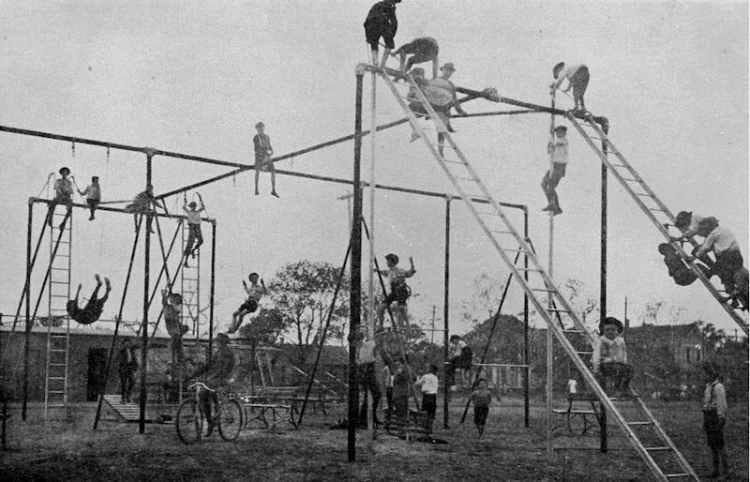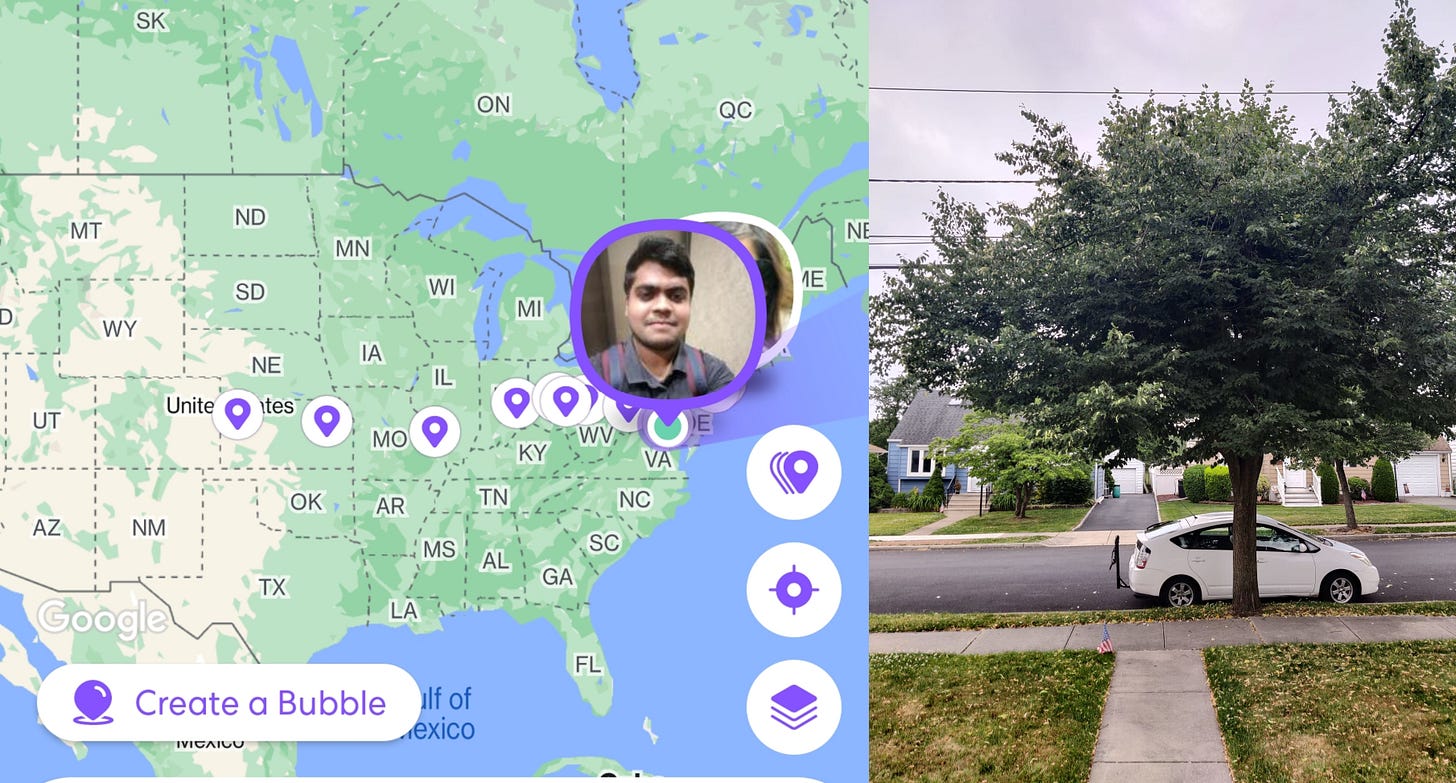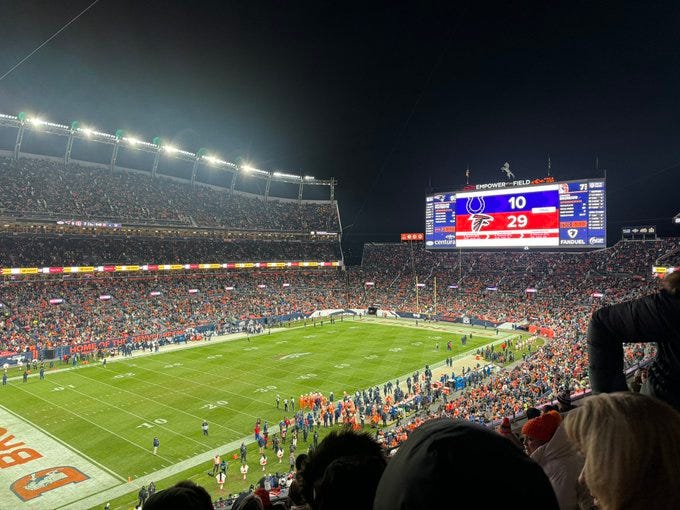Two transformative years in the land of promise
I arrived here in August 2022, and the journey since has been nothing short of extraordinary. It’s impossible to encapsulate my experiences here. From coast-to-coast road-tripping in my willy-wonka college car to standing on the House floor of the U.S. Capitol, and working from the Empire State Building, this adventure has surpassed my wildest dreams.
I’ve lived in Colorado (heaven on earth), DC (fine, Maryland — but it was just 8 miles from the Capitol, so don’t judge!), NYC (okay, technically North Jersey), and now Houston — my home. Summarizing what this country has given me and what it truly stands for would be impossible — maybe someday, I’ll give it a shot.
If yes, is there something specific that would interest you?
For now, I’ve shared some of my favourite memories at the end.
Now, let’s dive into what’s been happening recently and the lessons I’ve learned along the way:
The beauty of advertising - cognitive deception?
The accepted way of how ads work goes like this:
Rather than attempting to persuade us (via our rational, analytical minds), ads prey on our emotions. They work by creating positive associations between the advertised product and feelings like love, happiness, safety, and sexual confidence. These associations grow and deepen over time, making us feel favorably disposed toward the product and, ultimately, more likely to buy it.
The idea of emotional deception in ads, much like the concept from Inception, suggests that marketers plant subconscious ideas and images in our minds to influence decisions.
While this may sound plausible, I’ve always felt it makes us appear more irrational than we are. If “Inception” genuinely works, then, in fact, our preferences and goals are not just malleable, but effortlessly so. All an advertiser needs to do is show a pretty face next to a product, and suddenly we're filled with desire for it. This is an exaggeration of course. More realistically, we need to see an ad multiple times for that to happen.
According to game theory, we're not simply reactive beings; we make utility-maximizing choices.
Yes, ads can influence us, but we’re not powerless. We're not puppets at the mercy of every flashy billboard. We retain more agency than that. We aren't that easily manipulated.
Could it be the following?
Awareness: Simply informing customers that a product exists and how it works.
Persuasion: Making an argument or comparison, though less common today.
Guarantees: Offering guarantees or building brand trust (e.g., Ozempic)
Honest signalling: Conveying value by advertising in expensive locations, reassuring self-trust and commitment
My take: cultural embossing:
The effect of cultural embossing is far larger than the aforementioned mechanisms.
It might look like emotional deception - but I would argue it is not. Can you guess what is the underlying principle in the following ad?
Cultural embossing in advertising works by shaping how we’re perceived when we use certain products. Ads don’t try to change our preferences but associate products with certain identities or lifestyles.
For example, drinking Corona might signal you're a laid-back, "chill" person. Once ads establish these associations, it’s up to you to decide whether to align with that image. The key to this approach is public visibility—ads work best when they are seen by many people at once.
It’s called: consensus reality
For a fact to be common knowledge among a group, it's not enough for everyone to know it. Everyone must also know that everyone else knows it — and know that they know that they know it... and so on.
A product’s perception becomes ingrained in the cultural landscape. Unlike inception, this aligns with the principle of utility maximisation, where our choices reflect a strategy to gain respect and approval from our peers. By selecting certain products, we not only satisfy personal preferences but also signal social status or identity.
TL-DR: cultural embossing =
shallow emotional deception + common knowledge = inception into consensus reality
What you should remember:
Ads influence us not by bypassing our rationality, but by aligning with it.
Ads work by embedding products into our societal landscape, and avoiding them isolates us from essential cultural information, risking social irrelevance. Ads shape perceptions and behaviours through cultural embossing, meaning it's in our self-interest to engage with them.
Hope this was interesting to you - as it was to me.
Often overlooked, but magically powerful: Twitter lists
Twitter is a fantastic platform for connecting with diverse audiences, whether you're into sports, politics, economics, or simply looking to engage with journalists or thought leaders. If, like me, you juggle multiple interests—work, hobbies, and everything in between—Twitter Lists are a lifesaver. They help you manage the chaos by organizing people into categories, making your feed less overwhelming and more efficient.
It’s a simple way to streamline your learning and engagement.
TL-DR: it’s like having multiple - personalized home feeds or timelines for all your interests
You can either create yours or follow someone who did the curation for you. You can also have them private — the list is only available to you to see and is best suited where you need to travel incognito.
Here’s mine: https://x.com/DarshilBTW/lists
“Twitter is the most amazing networking and learning network ever built.
For someone whose pursuing their dream job, or chasing a group of mentors or peers, it’s remarkable. In any given field, 50-80% of the top experts in that field are on Twitter and they’re sharing ideas, and you can connect to them or follow them in your personal feed.
If you get lucky enough and say something they find interesting, they might follow you, and the reason this becomes super interesting is that unlocks direct message, and now all of a sudden you can communicate directly or electronically with that individual. Very, very powerful.
If you’re not using Twitter, you’re missing out.” — Bill Gurley
Go deeper:
Get started now:
Here’s to hoping you unlock the magic of Twitter Lists! So, what’s stopping you from diving in and getting organized?
Endnote: Playground in the 1900
Comparing modern playgrounds to the one above — see anything different?
I remember reading something somewhere about the real issue with risk and playgrounds... that modern playgrounds often hide risk, whereas older playgrounds it would be more obvious. The idea is that there were clearly places (high up, requiring climbing skill) in the old playgrounds that kids would slowly work their way up to conquering. Because the risk was obvious, kids would approach it with caution and build up skills to get there. In contrast, a lot of injuries occur when 'safe' playgrounds have kids try to do things not designed for, but because of the way they are made don't appear to be dangerous but actually are. Giving kids the ability to assess risk accurately, and develop the skill to take that risk, is the important part.
My takeaway:
Kids learn their limits by exploring, even if it means a few tumbles. It's not about shielding them from every fall, just the ones that truly matter. Letting them experience and recover teaches resilience and helps them understand their boundaries.
Have a great week ahead, until next time!
PS: Shoutout to the person who inspired me to get back. Hope your beach days are just as spectacular as you are.
The End
As promised, some of my favourite memories:
…and many more














I like the playground metaphor following the section on twitter lists and their placement in the whole idea of one's agency in an advertising world. Though I do not believe even with "real magic" one may retain total agency. But most of it one may. Grey area remains buried behind the green screen upon which are projected many a simulations of the desired.
References
[1] “Why Good Advertising Works (Even When You Think It Doesn’t) - The Atlantic.” Accessed: Dec. 28, 2024. [Online]. Available: https://www.theatlantic.com/business/archive/2011/08/why-good-advertising-works-even-when-you-think-it-doesnt/244252/
[2] “The war against today’s dangerously dull playgrounds | Hacker News.” Accessed: Dec. 29, 2024. [Online]. Available: https://news.ycombinator.com/item?id=21416682
[3] “Profile / X.” Accessed: Dec. 29, 2024. [Online]. Available: https://x.com/HistoryLoversC1
[4] “Consensus reality - Wikiwand.” Accessed: Dec. 28, 2024. [Online]. Available: https://www.wikiwand.com/en/articles/Consensus%20reality
[5] “Common knowledge (logic) - Wikiwand.” Accessed: Dec. 28, 2024. [Online]. Available: https://www.wikiwand.com/en/articles/Common%20knowledge%20(logic)
[6] “Ads Don’t Work That Way | Melting Asphalt.” Accessed: Dec. 28, 2024. [Online]. Available: https://meltingasphalt.com/ads-dont-work-that-way/